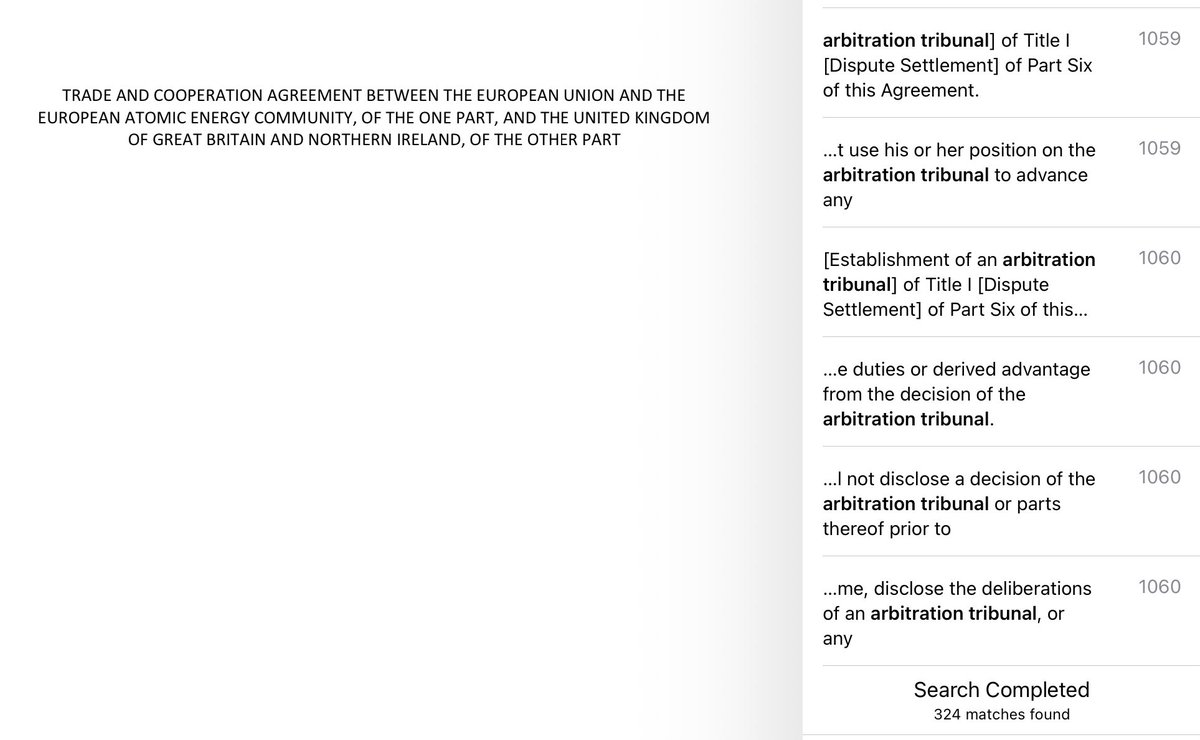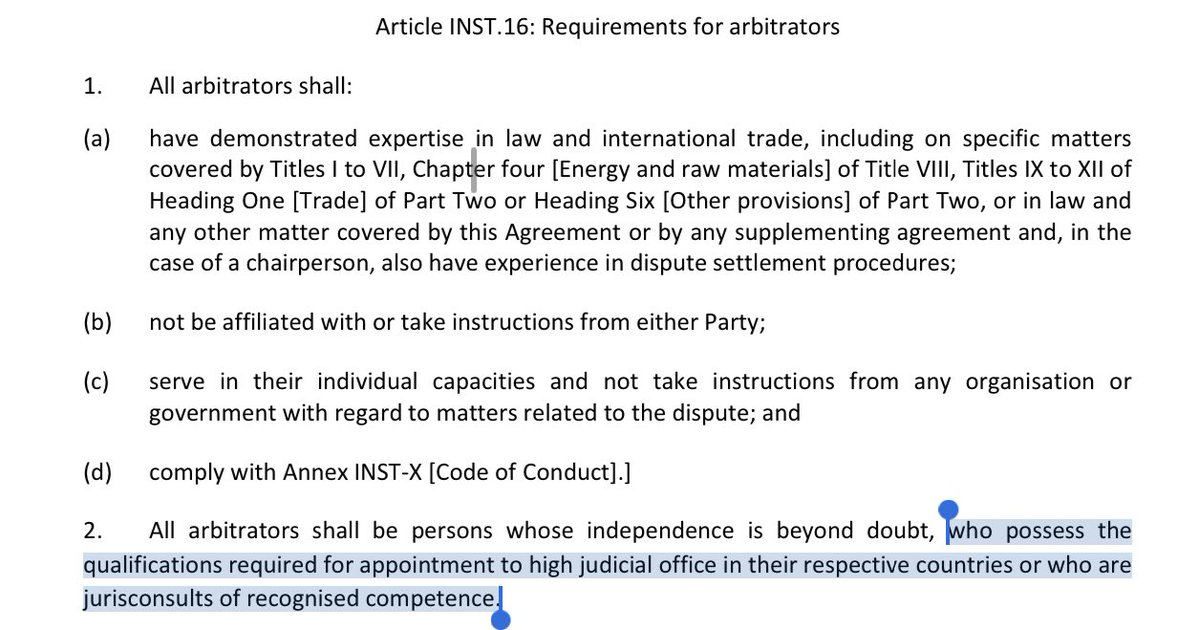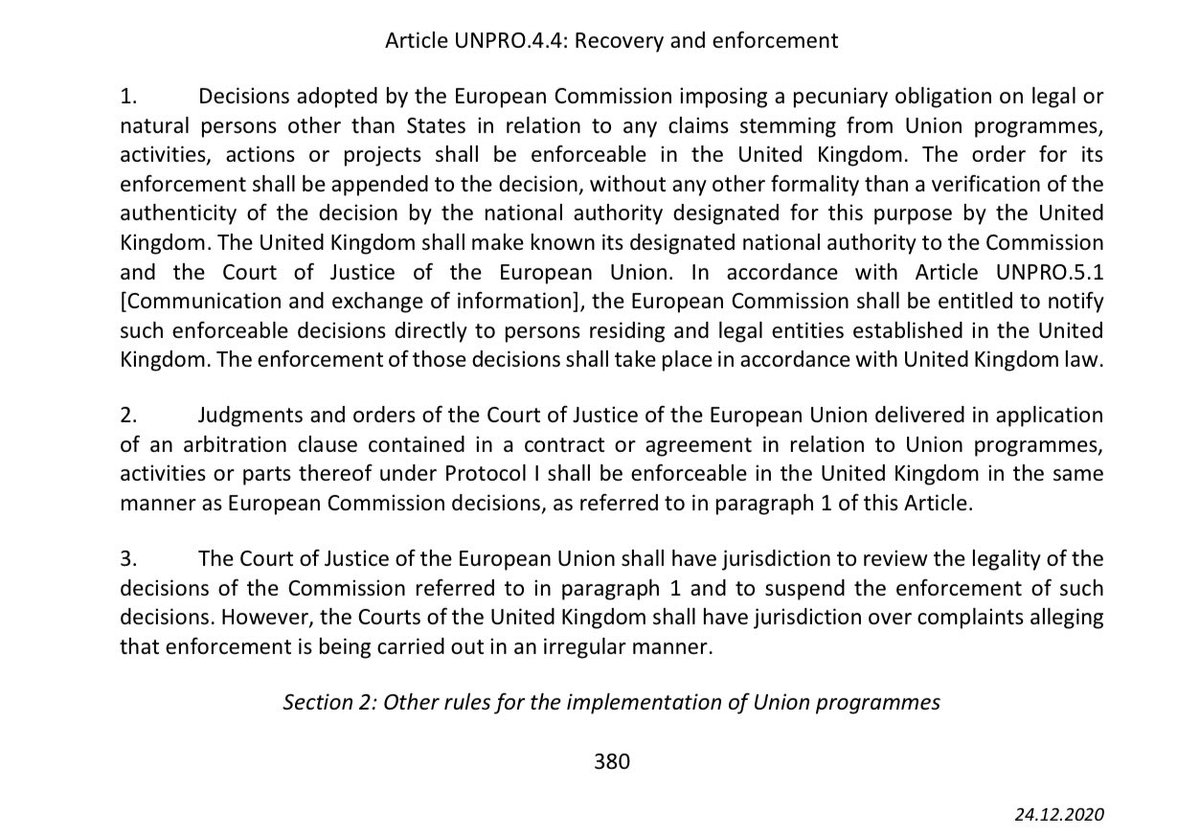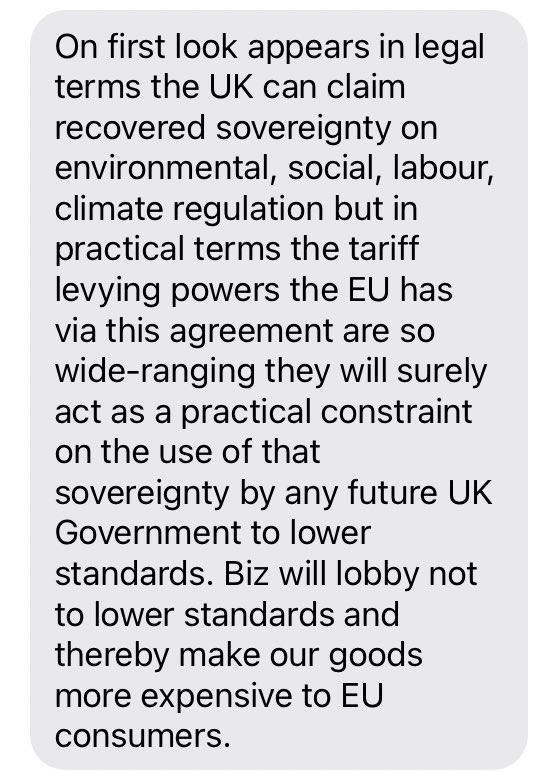Had a quick look at the 1246 page legal text, obtained by my BBC colleagues... first impressions - goes way beyond Canada-style deal, eg in terms of the “rebalancing clause” on future divergence... this will detain us for days/ weeks... first thoughts: https://www.bbc.co.uk/news/business-55449035
First it’s impressive long & detailed. But why so long if tariffs/quotas are zero?
length is about complicated institutional architecture whilst not compelling alignment, designed to create disincentives for divergence.
- expect these mechanisms to be used. They will matter
length is about complicated institutional architecture whilst not compelling alignment, designed to create disincentives for divergence.
- expect these mechanisms to be used. They will matter
So it’s zero tariff and zero quota *for now*... but there are a number of levers or switches in the agreement to turn off those tariff advantages, should one side be deemed to be acting “unfairly”.
- Non-regression
- Rebalancing
- Rules of origin
- Non-regression
- Rebalancing
- Rules of origin
- so having left Council and the Commission - this trade and cooperation agreement has something called a “Partnership Council” with 19 sub committees eg on Trade, energy, and four working groups on organic, cars etc, a Parliamentary Partnership assembly, Civil Society Forum etc
example of why its not Canada
There is something called an “arbitration tribunal” with wide ranging powers to allow say retaliatory tariffs or more in “rebalancing” of future divergence... also referred to in eg fishing annexe..in fact 324 mentions in agreement text. Not in CETA
There is something called an “arbitration tribunal” with wide ranging powers to allow say retaliatory tariffs or more in “rebalancing” of future divergence... also referred to in eg fishing annexe..in fact 324 mentions in agreement text. Not in CETA
Whatever you do, don’t mistake an “arbitration tribunal” for a “court” of “judges”... no sirreee.
Tribunals will have 3 arbitrators.
“Arbitrators” will instead be experts in law, “who possess the qualifications required for appointment to high judicial office”...
Tribunals will have 3 arbitrators.
“Arbitrators” will instead be experts in law, “who possess the qualifications required for appointment to high judicial office”...

So overlay fact it seems to have more teeth, with fact that “regulatory competition” is one of points of Brexit, unlike CETA - reasonable to see this architecture gets used, is designed to be used.
Other interesting bits...pandemic bailout money exempted from state aid provision
Other interesting bits...pandemic bailout money exempted from state aid provision
Government argue fact that the tribunals are not connected to ECJ, shows the win here on sovereignty ... only one reference in entire text to ECJ here on governance of UK access to EU programmes (eg Horizon), where ECJ arbitration judgements and orders will be enforceable in UK
That seems a very limited pathway for ongoing ECJ influence, connected to clearly EU schemes - but might it set a precedent for future involvement in wider EU schemes and agencies - eg EASA, EMA, ECA etc...
Lastly food industry, already smarting from events, say lack of equivalence for GB agrifood/ SPS problematic as it stands they say “New Zealand has a closer relationship on SPS with the EU than GB from Jan 1” with an agreement that limits checks (1%) & simplifies paperwork
Thanks Jill - just been on @bbcr4today trying to explain a first take on the most interesting things in the 1246 page document, and how it might apply - it will matter, particularly in the context of “regulatory competition” between UK & EU... https://twitter.com/jillongovt/status/1342741608001896448?s=21
The two examples I talked through to @justinonweb
1. UK medicines regulation quicker, more effective, leverages NHS data, wins pharma business - difficult to see what or how this could be complained about by other side through these new structures...
1. UK medicines regulation quicker, more effective, leverages NHS data, wins pharma business - difficult to see what or how this could be complained about by other side through these new structures...
2. UK uses deal to go round the world telling US electric car companies or SE Asian battery companies to set up shop in UK with full tariff free access to EU, but less regulation/ rights like Mrs Thatcher did with Nissan...
Clear mechanisms for EU to switch off tariff advantages
Clear mechanisms for EU to switch off tariff advantages
Thanks Doug - others may disagree, this is v much a work in progress please do chip in with thoughts, will reflect & adjust...
not that interested in “who won?”, obviously will pass HoC. But it will create winners and losers in economy, needs scrutiny. https://twitter.com/dmcwilliams_uk/status/1342750540074246144?s=21
not that interested in “who won?”, obviously will pass HoC. But it will create winners and losers in economy, needs scrutiny. https://twitter.com/dmcwilliams_uk/status/1342750540074246144?s=21
going back to EV/ battery example..if UK embarked on aggressive strategy of regulatory competition designed to win market/ invest share from EU (for some the point of Brexit) EU wouldve gone to same firms & said “tariff free access not guaranteed”, well before rebalancing “bites”
And this is the point - not really a *trade* negotiation.
It was UK declaring regulatory independence, while trying to maintain zero tariffs.
And EU trying to manage that divergence, & prevent eg UK becoming offshore assembly hub for US/ Chinese companies with free SM access
It was UK declaring regulatory independence, while trying to maintain zero tariffs.
And EU trying to manage that divergence, & prevent eg UK becoming offshore assembly hub for US/ Chinese companies with free SM access
This is true - production as is, should be ok. UK/ PM negotiated a phase in - a win. But for those companies planning massive investments now for 5 year’s time - majority of parts will not be allowed to come from eg Japan https://twitter.com/alenagermangirl/status/1342758443199946752?s=21
Last point from industry trade expert...
Export businesses will not lobby for lower standards/ aggressive regulatory competition in this environment, indeed EU-facing ones will lobby against such moves if it risks retaliatory tariffs. Thoughts?
Export businesses will not lobby for lower standards/ aggressive regulatory competition in this environment, indeed EU-facing ones will lobby against such moves if it risks retaliatory tariffs. Thoughts?
published now...
Plenty more stuff to chew over - esp lack of agrifood equivalence, fin services, conformity assessments, visas etc - havent even mentioned fishing.
Going to put some batteries in some walkietalkies now. And watch united go second. https://twitter.com/sfischer_eu/status/1342758530856710144?s=21
https://twitter.com/sfischer_eu/status/1342758530856710144?s=21
Plenty more stuff to chew over - esp lack of agrifood equivalence, fin services, conformity assessments, visas etc - havent even mentioned fishing.
Going to put some batteries in some walkietalkies now. And watch united go second.
 https://twitter.com/sfischer_eu/status/1342758530856710144?s=21
https://twitter.com/sfischer_eu/status/1342758530856710144?s=21
left fishing to others - very important thread - what happens after 2026 transition. “All the goddam fish in our waters” was the promise in the briefing before the deal was published... that’s not what you get from “Annex Fish.2”... https://twitter.com/glennbbc/status/1342823165047808003?s=21

 Read on Twitter
Read on Twitter







